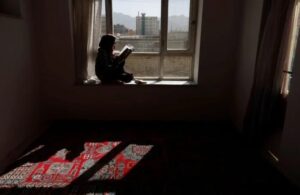KABUL (SW) – Salam Watandar’s investigation show that over the past many months, an array of cases of violence against women in Afghanistan have been pending with no signs of resolution.
In conversations with Salam Watandar, these women say that despite other problems in the judicial system, the ban on hiring a female defense lawyer is one of the core problems that has caused the postponement of their cases.
Aqila’s pale face and thin body tells about pain and illness she has been enduring. She is stuck at the Supreme Court run by the de-facto government and is looking for a solution to her case. Her eyes were sad and dry and seem to have thousands of questions. Clearly frightened, she showed her swollen feel and said she has been waiting for her case to be resolved for ages. Aqila said that she has stomach cancer and knows that she has no more time to live, but before the time runs out, at least her case should be resolved and the fate of her only daughter should be determined.
Aqila says that five years ago, she was seven months pregnant when her husband went to Turkey and left his wife and child. “After marriage, my companionship was good for two months. After that, wars and arguments, violence and negative conversations started, as he decided to go abroad but, I had no idea that he was leaving. I do not know anything about him. My daughter was in my womb for seven months when my husband left. I did not have a single dress for my child when I finally got cancer.”
The fate full of pain is not summed up here. Aqila also has narrations about the oppression and cruelty of her husband’s family and says that oppression by the husband’s family against the bride is a “custom”, but it is more unfortunate for a woman who is not supported by her husband. Aqila adds that her husband’s family finally forced her out of the house because she was forgotten by her husband.
Aqila says that she is now living with her four-year-old daughter in her father’s house, and her patience for her husband’s return is over. For this reason, a case has been lodged at the Supreme Court to determine her fate. But the Supreme Court told her that she has to wait another year for review of the case.
“When I went to the court, they said that they were reviewing the files left over from last year. They said that maybe it will be my turn next year,” she said.
Supreme Court of Afghanistan, a place where thousands of people have cases and women are also waiting for justice.
“My husband got married without giving me any information and it has been two and a half years since they went to America together,” Soraya said. She is a woman whose husband left her after nine years of marriage and immigrated to America after the regime change. Soraya now lives alone with her two seven-year-old and four-and-a-half-year-old daughters, and there is no news about the fate of her life together with her husband.
“I do not know when my husband got married. It has been two and a half years since my husband went to America; At first, I did not know about his departure.”
Near the Supreme Court, many women are present to pursue their cases, but due to family and social restrictions, they refused to talk to Salam Watandar.
Zuhal, pseudonym, was there with dozens of other women. She was looking for her case to be resolved. “12 years ago, my father said that if you even have to fall in the oven, you must marry this man.” She is a victim of the prevailing customs and traditions in the society and because she was named after her husband since childhood, she married her husband against her consent 12 years ago. Zuhal says that not only she suffered 12 years of violence, cruelty and torture by her husband, but the three children also endured the pain, but her husband’s moral weakness was another problem in their life together.
Zuhal adds that two years ago, her husband was arrested during an unethical act with a woman by the de-facto government. According to Zuhal, her husband was in prison for some time and in order to escape, he married a woman who had an illicit relationship. She says that due to her husband’s unethical actions, she has been asking for a compensations for losses for two years, and the fate of her case has not yet been determined, but her three children were taken from her and given to her mother-in-law.
Zuhal also has narratives about the pain of being away from her children, saying that she cannot live without them. “For a few minutes when he was at home, he would make excuses and beat me. He did not just beat me, but he used to beat my children together with me. My husband is a negative person. It ruined not only my and my children’s life, but thousands of people. In this situation, women’s voices are not heard. I even have my own proof, I have documents, it has been two years that none of my cases is resolved. I go to court and come back, there is no progress in my case.”
Salam Watandar also interviewed a woman named Hasina. Some 11 years ago, when she was 15 years old, Hasina was forced into marriage by her father.
She says that she endured violence and beatings by her husband until she was divorced and the children were deprived of seeing their mother. She cites the interference of her husband’s family in the affairs of their common life as the reason for the breakup of her life together.
Hasina adds: “I endured a lot of pain and suffering from my husband. I endured a lot of his cruelty. Finally, it happened that at the last moment in an unimportant conversation, he divorced me. He dragged me out of the house. My marriage was not by my will, it was by the will of my parents because I was young, I got married when I was 15 years old.”
However Hasina’s tears did not allow her to talk more but she said that it was difficult for her to be away from her children for a month. Hasina adds that if her husband wants, she will continue to live despite violence and cruelty with him, but she cannot stay away from her four children. For this, Hasina went to Kabul’s Deh Sabz district and asked to formalize her case; but in the first step, she was told that the custody of the children will be given to her husband and her efforts will not work.
“I request the government that a mother suffers a lot for her children; I have survived hunger, I have endured the cruelty of my husband; I wanted my children to reach somewhere and be progressive, I wish my children to be near me; I do not even want anything, I do not want money, I do not want their expenses. I beg for God sake, I want my children,” Hasina said.
In addition to this, there was a woman named Fahima sitting near the Supreme Court. Fahima is a woman who has a civil lawsuit and after more than a year, it is finally time to review her case. She says that after three years of marriage life, her husband passed away and it has been two years now that she has been seeking inheritance and mahr/dowry; but her sons do not give her this right.
Fahima narrates the process of pursuing her case: “As long as I waited for them to give me my rights to their satisfaction, they did not pay attention and did not consider any of my problems. The president of the Supreme Court asked me and said, go and sit with the elders so that your problem can be solved. They (elders) had two meetings.”
After the meetings regarding Fahima’s case did not result, she had to go to the Supreme Court again and write her lawsuit, but this time her lawsuit was rejected by the Supreme Court once again.
Fahima says that the inactivity of female defense lawyers has made it difficult for women who have cases in the Supreme Court and they cannot share all the matters of their cases with male defense lawyers. “If the lawyer is a woman, women can talk about any of their problem. This is my problem”.
However, a number of female lawyers who have represented women in various cases in the republican regime say that with the change of the republican regime, there have been significant changes in the working process of judicial and legal institutions, and the review of cases takes a lot of time.
They add that the eliminating of specific references and authorities that worked in the women’s sector has declined women’s access to judicial and legal services.
Andisha Rahmani, a defense lawyer, says: “Previously, family cases took at least three months and maximum of six months. Priority was given to cases of running away from home due to violence. They were dealt with in the shortest possible time, but now, according to the file number, family cases are dealt with, however, not according to the number of the years of the cases.”
“In the past, there were clear references when women went from one place to another, they were helped and their cases were dealt with as soon as possible, but unfortunately, currently, when we go to court, the clients tell us that it takes almost a year for their cases, but it still does not even come out of the first court,” said Hakimi, another defense lawyer in the previous regime.
Meanwhile, women’s rights activists consider the presence of women in judicial and legal departments as an urgent need and say that the continued prohibition of women’s work in judicial and legal service departments will cause the majority of women’s cases to remain closed and without ant result.
Humaira Farhangyar, a women’s rights activist, says: “There are some family problems; some cases that even telling a man about it will cause him to close the case. The presence of women in the society is very important, especially in the case of cases, women who are in the judicial department should be allowed to work so that a sister to be able to go there in a safe space away from any kind of abuse and violence for her issues”.
However, Zabihullah Mujahid, the spokesperson of the Islamic Emirate, confirmed the lack of a specific structure for investigating women’s cases. He told Salam Watandar that, women who have such cases can hire male lawyers to advance their cases.
“Like our brothers, our sisters can go to the courts for legal recourse. Of course, we do not have lawyers for women yet, but in general, they can get a defense lawyer, including men. There is no problem, however, any special mechanism has not been considered separately for women so far because its conditions are a bit complicated and closed until the time when the opportunity is available, public proceedings will be used,” Mujahid said.






